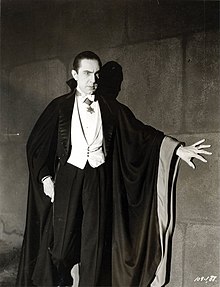User:MichelleCUNO/Supernatural fiction
Description
[edit]
In its broadest definition, supernatural fiction overlaps with examples of weird fiction, horror fiction, vampire literature, ghost story, and fantasy. Elements of supernatural fiction can be found in writing from the genre of science fiction. Amongst academics, readers and collectors, however, supernatural fiction is often classed as a discrete genre defined by the elimination of "horror", "fantasy", and elements important to other genres.[1] The one genre supernatural fiction appears to embrace in its entirety is the traditional ghost story.[2]
The fantasy and supernatural fiction genres would often overlap and may be confused each for each other, though there exist some crucial differences between the two genres. Fantasy usually takes place in another world, where fantastical creatures or magic are normal. In supernatural fiction, though, magic and monsters are not the norm and the mystery of such things is usually closely intertwined in the plot. The supernatural genre highlights supernatural creatures or happenings within the real world. Moreover, supernatural fiction also tends to focus on suspense and mystery and less on action and adventure.
Occult detective fiction combines the tropes of supernatural fiction with those of detective fiction. Supernatural fiction and drama has supernatural elements blended into a story about the characters' internal conflict and/or a dramatic conflict between the protagonist, human and/or supernatural world, society and between groups.
The following are features that are often put together in order to create a work of supernatural fiction[3]:
- Faraway or unfamiliar setting
- Anti-promethean, anti-utopian, anti-scientific pessimism[4]
- Setting in the past or future[4]
- Supernatural or bizarre themes, characters and plots
- Elements of the sublime[5]
Popular Supernatural Fiction
[edit]| Title | Author |
|---|---|
| Dracula | Bram Stoker |
| 'Salem's Lot | Stephen King |
| The Stand | Stephen King |
| It | Stephen King |
| The Twilight Saga | Stephanie Meyer |
| Harry Potter Series | J.K. Rowling |
| The Tales of H.P. Lovecraft | H.P. Lovecraft |
| The Witches | Roald Dahl |
| Frankenstein | Mary Shelley |

| Title | Director |
|---|---|
| Interview With a Vampire | Neil Jordan |
| Sinister | Scott Derrickson |
| Paranormal Activity | Oren Peli |
| Transylvania | Genndy Tartakovsky |
| E.T. | Steven Spielberg |
| Ghostbusters | Ivan Reitman |
Femininity and Gothic Fiction
[edit]Throughout the introduction and popularization of the genre of supernatural fiction and the sub-genre Gothic fiction, there has been change in the portrayal of women, women's roles and femininity within literature. The dichotomy of opposing female roles and public perception can be seen in Bram Stoker's, Dracula. Stoker presents an (at the time) familiar traditional female role in this novel while also introducing ideologies and behaviors associated with the "New Woman"[6] Differing ideas of women and what women should be were presented in much of the Gothic literature at the time. A myriad of archetypes were developed to portray both new and traditional ideas of what being woman means and what a women's role is. Contrasting women are often written in order to highlight the extremes within one another like the women in the film, The Man with two Brains[7]. Gothic fiction is often associated with increased sexuality, lust and desire, which was radically different than allowed social norms at the time that the genre began to increase in popularity.
Women's roles and portrayal's in Gothic literature were at the forefront of author's and critic's minds because women were the main consumers and largest influence over the Gothic literature market[7].
Internet fiction
[edit]
Supernatural beings have also seen common uses in internet creepypastas and urban legends; a well-known supernatural Internet character is the Slenderman, a tall faceless being associated with the forest. Another well-known internet urban legend is the Backrooms, an endless liminal space of moist carpet, humming fluorescent lights and monotone yellow wallpaper. The Backrooms are commonly depicted as being inhabited by supernatural monsters known as Entities
Much circulation of internet supernatural fiction occur on the website, 4chan. 4chan allows for stories to be told across cultures and borders which heighten elements of supernatural fiction.
| This is the sandbox page where you will draft your initial Wikipedia contribution.
If you're starting a new article, you can develop it here until it's ready to go live. If you're working on improvements to an existing article, copy only one section at a time of the article to this sandbox to work on, and be sure to use an edit summary linking to the article you copied from. Do not copy over the entire article. You can find additional instructions here. Remember to save your work regularly using the "Publish page" button. (It just means 'save'; it will still be in the sandbox.) You can add bold formatting to your additions to differentiate them from existing content. |
Article Draft
[edit]- ^ Cavaliero, Glen (1995). The Supernatural and English Fiction. Oxford, England: Oxford University Press. p. 159.
- ^ Wilson, Neil (2000). Shadows in the Attic: A Guide to British Supernatural Fiction, 1820–1950. London: The British Library.
- ^ "Supernatural Fiction". TV Tropes. Retrieved 2024-04-28.
- ^ a b Brantlinger, Patrick (1980). "The Gothic Origins of Science Fiction". NOVEL: A Forum on Fiction. 14 (1): 30–43. doi:10.2307/1345322. ISSN 0029-5132.
- ^ Novak, Maximillian E. (1979). "Gothic Fiction and the Grotesque". NOVEL: A Forum on Fiction. 13 (1): 50–67. doi:10.2307/1344951. ISSN 0029-5132.
- ^ Senf, Carol A. (1982). ""Dracula": Stoker's Response to the New Woman". Victorian Studies. 26 (1): 33–49. ISSN 0042-5222.
- ^ a b Mudge, Bradford K. (1992-01). "The Man with Two Brains: Gothic Novels, Popular Culture, Literary History". PMLA. 107 (1): 92–104. doi:10.2307/462803. ISSN 0030-8129.
{{cite journal}}: Check date values in:|date=(help)
